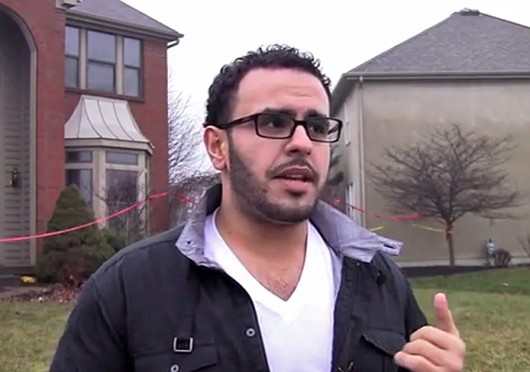An Ohio State graduate has been imprisoned in an Egyptian jail for roughly 170 days, but some of those closest to him said his hope for release remains strong.
Mohamed Soltan, a dual American-Egyptian citizen who graduated from OSU in 2012 with a degree in economics, was arrested in Egypt in August after the military coup and overthrow of former President Mohammed Morsi. Morsi’s time in office was filled with political unrest amongst citizens, despite his being the first democratically elected Egyptian president.
President Hosni Mubarak had been overthrown during an Egyptian revolution in 2011.
Soltan was participating in a Muslim Brotherhood-led protest in a square in Cairo in August to defend democracy when he was shot in the arm. As many as 900 people were killed in the square that day, according to The New York Times.
The Muslim Brotherhood is the Islamic political party Morsi represented.
Soltan was later arrested in his home while recovering from surgery to remove the bullet.
Despite having three screws placed in his arm after the shooting, Soltan’s brother, Omar Soltan, said the prison authorities refused to give Mohamed Soltan a sling, which led to the metal screws tearing into his muscle.
Mohamed Soltan underwent surgery using a razor and pliers without anesthesia and sterilization by a doctor who was a fellow cellmate.
“I laid on a dirty mat as my other cellmates held me down to ensure I did not jolt from the pain and risk permanent loss of feeling and function in that arm,” Mohamed Soltan said in a letter to The New York Times that was published Jan. 24.
According to a State Department official, Mohamed Soltan’s situation is being monitored to ensure he receives fair trial and due process.
“The Department of State takes the welfare of U.S. citizens incarcerated abroad very seriously and stands ready to assist them and their families. We are monitoring Mr. Soltan’s case and have raised it with the Egyptian authorities. U.S. Embassy Cairo personnel have visited Mr. Soltan, and are in regular contact with Mr. Soltan’s family,” the State Department official said in an email Monday. “We remain concerned about Mr. Soltan’s health and have urged the Government of Egypt to ensure that he is receiving all necessary and appropriate medical treatment.”
The official also said the U.S. government looks to the Egyptian government to “ensure that all of those arrested or detained are afforded due process and fair and transparent trials, and that the law is applied equitably and free of political bias.”
“This includes clearly and (publicly) presenting evidence and ensuring that charges are made within a reasonable time frame,” the official said.
In Mohamed Soltan’s letter, though, he expressed his disappointment with what he feels is a lack of support from the U.S. government.
“The only sensible, yet unacceptable conclusion that I can come up with is that the U.S. government’s protections of political interests is more important and takes precedence over the protections of its citizens’ rights, freedoms, and safety abroad,” Mohamed Soltan said in the New York Times letter. “No American should have to come to that conclusion, and no human should experience the inhumane circumstances (I am) facing.”
Omar Soltan said the U.S. government has not been able to give Mohamed Soltan the medical attention necessary, and as such, he is currently suffering from a blood clot because of the lack of medical care.
“Even the least that the U.S. government has promised us, and they should be able to release him or negotiate with the government there to have him deported, but nothing has been happening,” Omar Soltan said.
Despite the head of state security in Egypt telling him he would be released in due time, Mohamed Soltan is currently imprisoned on false charges, Omar Soltan said.
“They’re accusing him of being a part of a terrorist organization and funding it, but it has nothing to do with him being a part of the protest,” said Omar Soltan, a political science major at Northern Virginia Community College.
During the time of the protests, Mohamed Soltan played the role of a spokesman, delivering updates to different media outlets, said Omar Soltan.
He met with a judge Jan. 26, but although no evidence was presented against him, the judge sentenced Mohamed Soltan to an additional 45 days in prison. He then decided to go on a hunger strike, Omar Soltan said.
Omar Soltan said the judge is able to renew the number of days Mohamed Soltan stays indefinitely despite the lack of evidence against him, but Mohamed Soltan is staying strong, even on the hunger strike.
“(Mohamed Soltan’s strength and hope) is exactly the opposite of what the regime wants,” Omar Soltan said.
Omar Soltan said, though, his family doesn’t expect Mohamed Soltan to be released anytime soon.
“The only hope that Mohamed comes out is through the American government or that the regime over there falls,” Omar Soltan said.
One of Mohamed Soltan’s friends Abdul Dada said Mohamed Soltan always encouraged others to vote, so the U.S. government’s apparent lack of support makes him feel like Mohamed Soltan is being betrayed.
“He wasn’t even doing anything. He didn’t harm anyone. He was just talking about what he was seeing,” Dada said.
Despite being unsure of Mohamed Soltan’s future, Jana Al-Akhras, a fellow OSU graduate and friend of Mohamed Soltan, said Mohamed Soltan still hopes to see a free Egypt one day.
“I have never known him to be the type to wallow in his own misery or wallow in his own suffering, he is a very strong individual, so I think hope is what keeps him through it,” Al-Akhras said.



